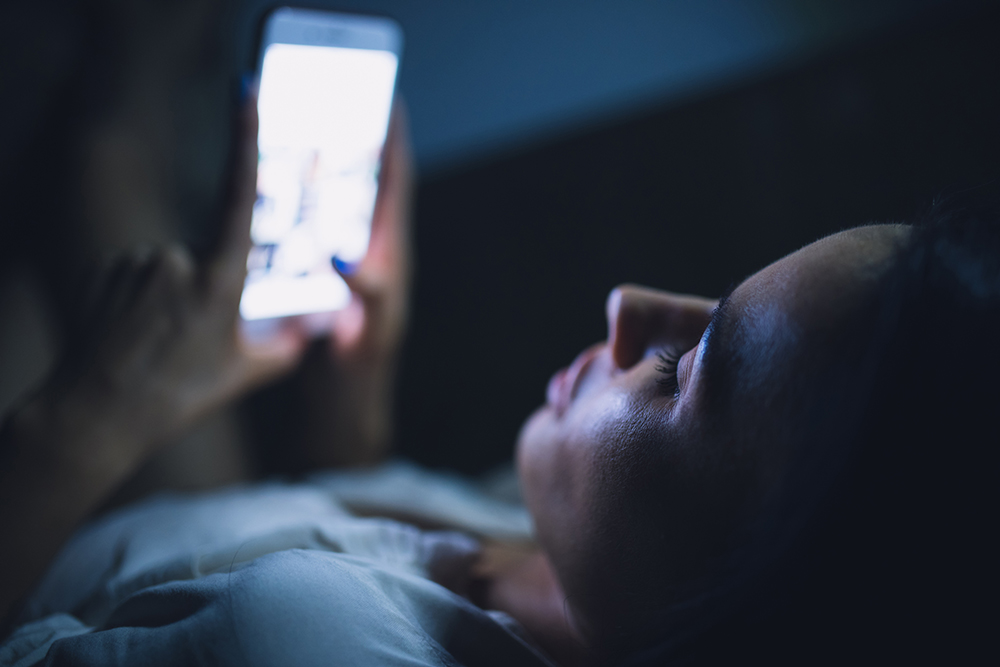Your smartphone may feel like an extension of yourself – the last thing you check before putting your head on the pillow and the first thing you reach for when you wake up. However, during Sleep Awareness Month, it’s crucial to address how nighttime phone use can disturb healthy sleep patterns. Here are effective strategies to help you disconnect from your digital devices at night and follow healthier bedtime habits.
Understanding the Impact
Using your phone before bedtime may seem like a harmless thing to do, but consider the invisible ways it can inhibit your ability to get a full, restful night of sleep.
- Blue light exposure: Smartphones and other devices with screens emit blue light, which can interfere with your circadian rhythm by suppressing melatonin, the hormone responsible for regulating sleep-wake cycles. This disruption makes it more challenging to fall asleep and enjoy restorative sleep.
- Mental stimulation: Engaging with digital content such as your work emails or social media keeps your brain alert and active when it should be winding down. The barrage of information can lead to increased anxiety and stress, further hindering your ability to fall asleep peacefully.
Strategies for Reducing Nighttime Phone Use
Use these tips to help you break the habit of using your smartphone, tablet or laptop before bed.
- Set a digital curfew: Choose a specific time each night when you will stop using your phone. Ideally, this should be at least an hour before your intended bedtime. Inform friends and family of your curfew to help manage expectations regarding nighttime communication.
- Use a lock box: If self-discipline isn’t enough, consider getting a lock box where you can keep your phone overnight. Locking away your phone removes the physical temptation and helps establish a clear boundary between your digital and personal life.
- Replace the habit: Substitute phone use with healthier bedtime rituals. Meditation can help calm your mind and prepare your body for sleep. Reading a hard-copy book under soft lighting can also relax your brain without the harmful effects of blue light.
- Create a relaxing bedtime routine: Develop a series of calming activities to signal to your body that it’s time to wind down. These could include taking a warm bath, practicing gentle yoga stretches or listening to soothing music.
- Use technology to your advantage: If you must use your phone at night, install an app designed to reduce blue light emission. These settings can minimize the disruptive effects of blue light on your sleep cycle.
- Keep your bedroom a phone-free zone: Charge your phone in another room to resist the urge to check it during the night, and get an alternative alarm clock so your device isn’t the first thing you reach for in the morning. This tactic will help you fall asleep faster and improve your sleep quality by ensuring notifications don’t disturb you.
Embracing Better Sleep
Deliberately disconnecting from your phone at night can significantly improve your sleep quality and overall well-being. By implementing these strategies, you’re honoring Sleep Awareness Month while taking vital steps toward a healthier lifestyle. Remember, good sleep is foundational to your physical health, mental clarity and emotional balance. Make every effort to put your phone down and reap the rewards.
A healthy sleep routine is a must-have in addiction recovery. Sleep deprivation can exacerbate stress, decrease your resilience to triggers and increase your risk of relapsing. Addressing sleep issues is essential for anyone looking to overcome substance abuse and build a foundation for lasting sobriety. New Found Life provides comprehensive care that addresses substance abuse and its underlying causes. Through a combination of evidence-based therapy and lifestyle modifications, you can learn healthier ways to manage sleep issues without resorting to substance use. Contact us today to request help.

